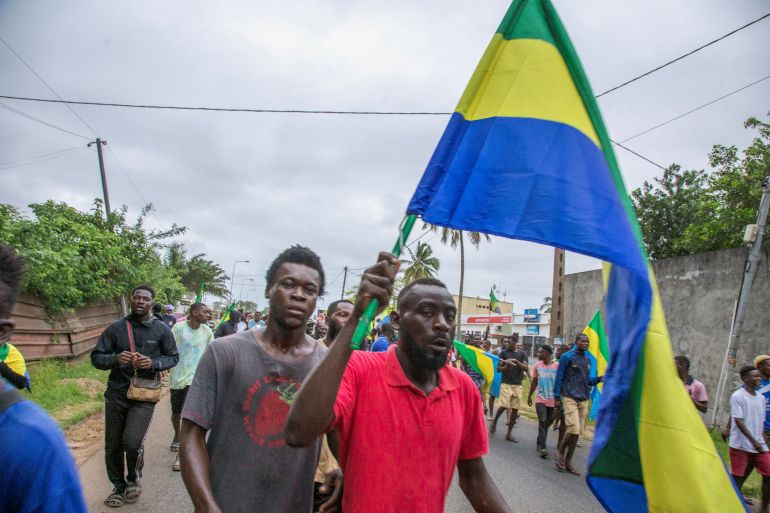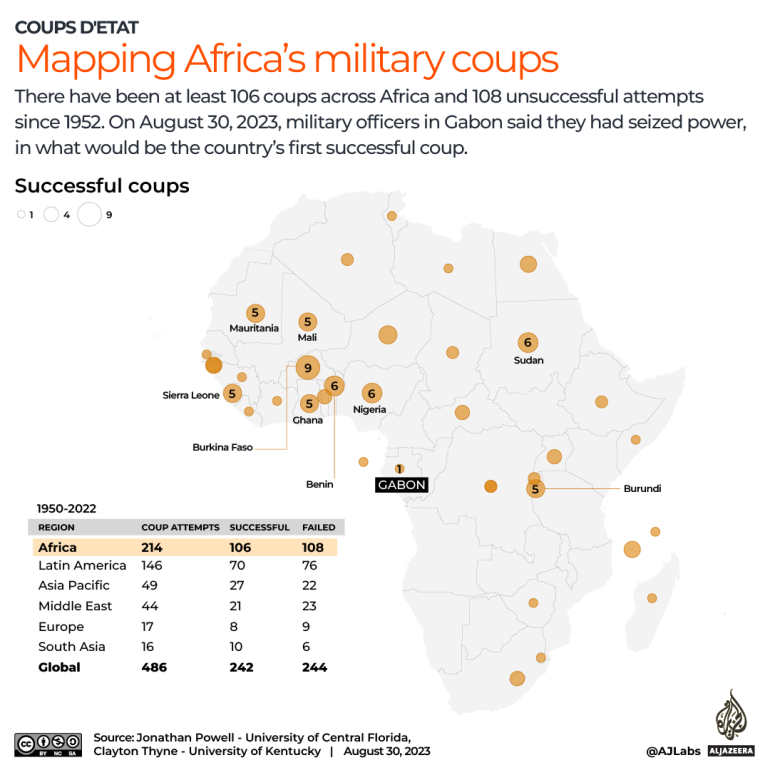African Union suspends Gabon’s membership after military coup
The body said it ‘strongly condemns the military takeover’ which resulted in the ouster of President Ali Bongo Ondimba.

The African Union’s Peace and Security Council said it has decided to “immediately suspend” Gabon following the military coup in the country this week.
The body said on X, formerly Twitter, that it “strongly condemns the military takeover of power in the Republic of Gabon” and has decided “to immediately suspend the participation of Gabon in all activities of the AU, its organs and institutions”.
Keep reading
list of 4 itemsPhotos: Hundreds celebrate in Gabon’s capital after soldiers seize power
World reaction to the military coup in Gabon
General Nguema named Gabon’s transitional leader after coup
The announcement came after a meeting of the council on the situation in Gabon following Wednesday’s coup that followed disputed elections in which President Ali Bongo Ondimba was declared the winner.
It said the meeting was chaired by African Union commissioner for political affairs Bankole Adeoye of Nigeria and the current holder of the council’s rotating chair, Burundi’s Willy Nyamitwe.
The takeover ended the Bongo family’s almost six decades in power and created a new conundrum for a region that has struggled to deal with eight coups since 2020.
Nigeria’s recently elected president Bola Tinubu called it a “contagion of autocracy”.
“My fear has been confirmed in Gabon that copy cats will start doing the same thing until it is stopped,” Tinubu, who chairs West Africa’s main regional body ECOWAS, said on Thursday.
The general who overthrew Gabon’s Bongo dynasty will be sworn in on Monday as transitional president, the army said, as the opposition called for its candidate to be recognised as the winner of weekend elections.
The military sought to reassure donors they would “respect all commitments” at home and abroad and “phase in” transitional institutions, Colonel Ulrich Manfoumbi Manfoumbi, spokesman for the new regime, said on state television.
The swearing-in of new leader General Brice Oligui Nguema will take place at the constitutional court, said the spokesman, providing the first indication of how the Committee for the Transition and Restoration of Institutions (CTRI) would operate following Wednesday’s putsch.
ECCAS condemned the coup, saying in a statement that it planned an “imminent” meeting of heads of state to determine how to respond. It did not give a date.
Senior officers in Gabon announced their coup before dawn on Wednesday, shortly after an election body declared that Bongo had comfortably won a third term after Saturday’s vote.
Later on Wednesday, a video emerged of Bongo detained in his residence, asking international allies for help but apparently unaware of what was happening around him. The officers also announced that Nguema, former head of the presidential guard, had been chosen as head of state.
Working to contain ‘contagion of autocracy’: ECOWAS
Tinubu said on Wednesday that he was working closely with other African leaders to contain what he called a “contagion of autocracy” spreading across Africa.
ECOWAS threatened military intervention in Niger after a coup there on July 26 and imposed sanctions, but the military government has not backed down. Military leaders elsewhere have also resisted international pressure, such as in Mali. They have managed to hold on to power, and some have even gained popular support.
Central Africa’s political bloc, the Economic Community of Central African States (ECCAS), condemned the coup in a statement, saying it planned an “imminent” meeting of heads of state to determine how to respond. It did not give a date.
Al Jazeera’s Nicolas Haque, reporting from Dakar, Senegal, said there had been “quite a muted reaction” from the Central African Economic and Monetary Community (CEMAC) – in part due to a “fear in the region of a contagion of coups” among countries with “similar regimes to the Bongo dynasty”.

“You have President [Teodoro] Obiang [Nguema Mbasogo] in Equatorial Guinea, who has been in power since 1979. And then in Cameroon, President [Paul] Biya, who has been in power since 1982, elected time and again during these presidential elections that were, according to critics, marred by fraud,” Haque said.
The events follow coups in the past four years in Mali, Guinea, Burkina Faso, Chad and Niger, highlighting the limited leverage of African powers once the military takes over.